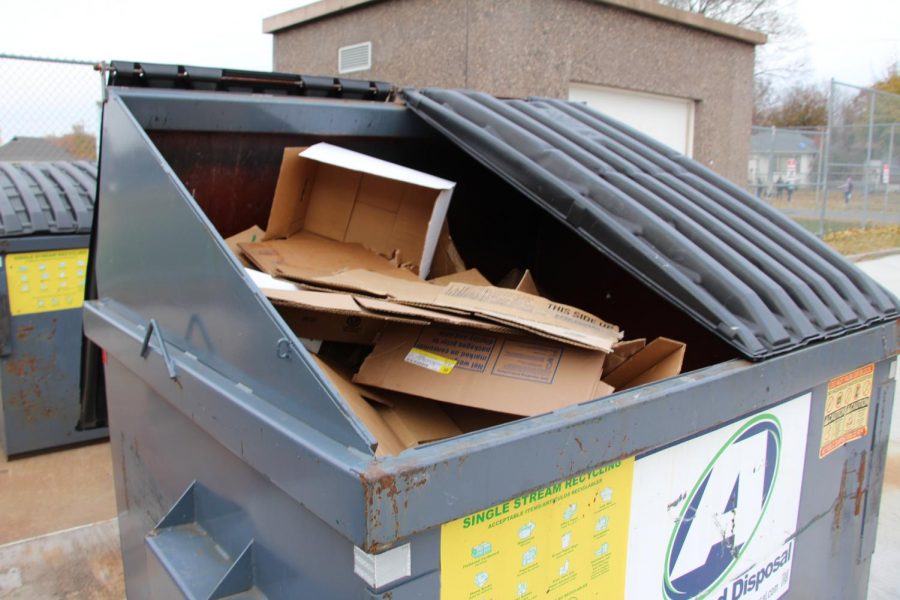Shipping of waste to Southeast Asia: what REALLY happens to your recycling
The US and other western countries have been shipping their recycling to countries in Southeast Asia for years. Much of the waste sent is unrecyclable plastic waste which has caused environmental damage to the Southeast Asian region.
November 23, 2019
The environmental justice movement used to be centered around electric cars, vegan diets, and universally reducing our carbon footprint. Over the past few years that focus has changed to become more inclusive, and now additionally focuses on taking down systems of power that create most of the damage to the environment. The movement has gained traction with many new followers and political supporters, including many Democrats running for president. Environmental movements like Youth Climate Strike have done a good job to educate people about the issue. However, the movement has remained surprisingly silent about an issue that is very important in their new angle: the shipping of “recycling” to Southeast Asian countries.
The US, UK, Australia, Canada, Germany, and other western countries have been shipping their “recycling” to countries in Southeast Asia. The problem with this is that a lot of the recycling isn’t actually recyclable, for example most plastics. The countries of Southeast Asia have received 10s of millions of tons of recycling and garbage over the last 25 years. If you are having trouble imagining how much that is, it weighs more than 67,000 blue whales.
The countries in Southeast Asia have been buying this waste so it’s not like western countries dump it there without permission, but that doesn’t make it right. For up until January this year, China bought “recycling” from western countries as well. In 2012, China received half of the US’s exported waste. But China decided that they had enough and banned all imports of forgien recycling and waste. China started taking trash back when they were a poorer country, it was a way to boost their economy. Now that they have risen economically and on the power scale they no longer need to take the world’s trash. This situation is similar to the one in Southeast Asia, the Southeast Asian countries that are receiving recycling are poorer and getting rid of the world’s waste is a way that they can make money.
After China stopped taking trash, Malaysia took the majority of the trash from the west. Many other Southeast Asian countries like Indonesia, Cambodia, Vietnam, etc. picked up in the market as well.
As a person who is partially of Asian decent, this really upsets me. Thinking about how the US and its allies send their trash and “recycling” to Asia is upsetting enough. What really gets me is that nobody talks about this. When I attended the climate strike in St. Paul this September, I eagerly hoped that there would be someone there to talk about the sending of trash to Southeast Asia. When one of the main speakers announced that they had no more speakers for us, my heart sank as I found myself in a familiar place: failing to be represented.
The lack of conversations about this problem have led to the issue growing more intense each year. In Indonesia, imported trash is dumped in villages where people live, it has become such a normal part of life for some Indonesians that children play in it and adults make a living from sorting through the waste.
It is pretty disturbing knowing that we ship all of our waste to other countries to deal with but what is even more disturbing is what it does to those countries. The recycling piles up in collection centers and often overflows into nearby land. Since most of the non recyclable “recycling” is plastic, it causes a lot of air and land pollution. The garbage flows into nearby rivers, lakes, and even the ocean. Southeast Asian countries are responsible for more than 60% of the plastic in oceans, and you could bet a lot of it comes from western countries.
While the waste affects the environment, it also affects the citizens. People who eat seafood could very much eat sea animals who have eaten plastic. This happens because the plastic breaks down in the water into microplastics and organisms like fish accidentally eat them when they try to eat plankton. Microplastics also affect marine life that eat organisms that have eaten the microplastics, and pollutants are transferred up the food chain. Pollution in the environment affects human living conditions.
The countries of Southeast Asia are tired of being a dumping ground. They have taken 10s of millions of tons of garbage for over 25 years, and now they want to send it back. Southeast Asian countries are working on banning all foreign waste as well as trying to send back the unrecyclable waste.
Malaysia has over 300 containers of unrecyclable waste waiting to be sent back to their original countries. The US, Canada, Hong Kong, Japan, and some European countries are amongst the places that Malaysia is trying to make a deal with to send the waste back. The Phillipines tried to send Canada it’s waste back in 2016, and three years later, Canada finally agreed to take back the trash.
At this point, Southeast Asia has done it’s part by putting restrictions on importing waste. Indonesia, Malaysia, and the Philippines rejected recent trash imports and Thailand is working to ban plastic waste imports. Now it’s the US and its western allies turn to do their part.
The US however isn’t likely to do anything if we keep silent about this issue. I encourage environmental activists to try and bring this into the environmental justice fight. I especially would push for climate strike organizers to push to get a speaker who knows a lot about this topic to come to some of the rallies. This would be great because it would help shift the narrative of climate activism towards also focusing on what the US does to Southeast Asia.
I finally encourage readers to try and learn more about this topic. The next step after this would be to send letters to politicians, petition, and on an individual basis, watch what you recycle. Try to cut back your plastic use and try not to recycle plastics, because even if there is the little recycling triangle on the plastic, it very likely isn’t recyclable.
As I mentioned earlier, the climate change fight has moved into not only focusing on individual change but also systematic change. Helping end shipping non recyclable waste to Southeast Asia is the next step the movement must take to continue the fight for environmental justice.






